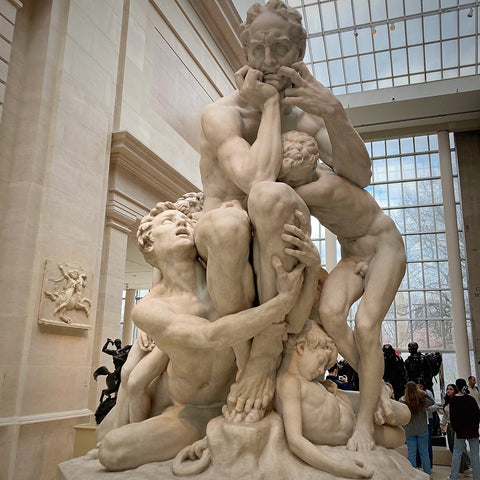
Italian Count Ugolino of Pisa was involved in the political struggles which ravaged Medieval Tuscan society. Like Dante Alighieri, the Florentine, Ugolino found himself on the wrong side of the political fight. As a result, in 1289, he was imprisoned in the Muda, a Pisan tower, along with two sons and two grandsons. The tower keys were flung into the Arno and the five family members were cruelly starved to death. Dante (then exiled in Ravenna) featured Ugolino in his Divine Comedy. As the count lays starving in the tower, his sons and grandsons beg their beloved father to eat them—thus preserving his own life. While Dante illustrates the complex anxiety of a man pondering the canabilism of his offspring, Dante does not relate the decision that Ugolino makes. (Recent DNA analysis of their five bodies show that their bones contain magnesium but no zinc—indicating that none of them had eaten any meat in the final tortured weeks of their lives.)
Nineteenth Century French sculptor, Jean-Baptiste Carpeaux (1827-1875), did a few versions of Ugolino and His Sons. This version, carved between 1865 and 1867, was acquired immediately by the Metropolitan. Carpeaux exhibits technical bravado, capturing the personalities of the five males entwined within the towering group. He captures Ugolino's anxious face, curled toes and gnarled fingers (on which gnaws). Another son clings to his father's legs while a grandson buries his head while hugging his waist. The smallest child (is he sleeping or dead), lies peacefully at Ugolino's feet. In cold, hard marble, Carpeaux was able to convey so much human feeling, energy and drama.
Jean-Baptiste Carpeaux was born of a stone mason. Perhaps stone ran in his family's veins? He studied in Paris at the École des Beaux-Arts and he won the Prix de Rome, the French award with a purse which allowed its young winners to live and study in Rome for three to five years. Naturally, Michelangelo was Carpeaux's lodestar. Carpeaux wrote, "When an artist feels pale and cold, he runs to Michelangelo in order to warm himself, as with the rays of the Sun." Along with Michelangelo, Carpeaux is in that rare handful of most-accomplished marble sculptors.
Though our Greenwich Village store is now permanently closed, LEO Design is still alive and well! Please visit our on-line store where we continue to sell Handsome Gifts (www.LEOdesignNYC.com).
We also can be found in Canonsburg, Pennsylvania, at The Antique Center of Strabane (www.antiquecenterofstrabane.com).
Or call to arrange to visit our Pittsburgh showroom (by private appointment only). 917-446-4248

